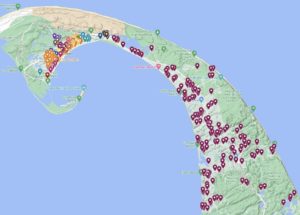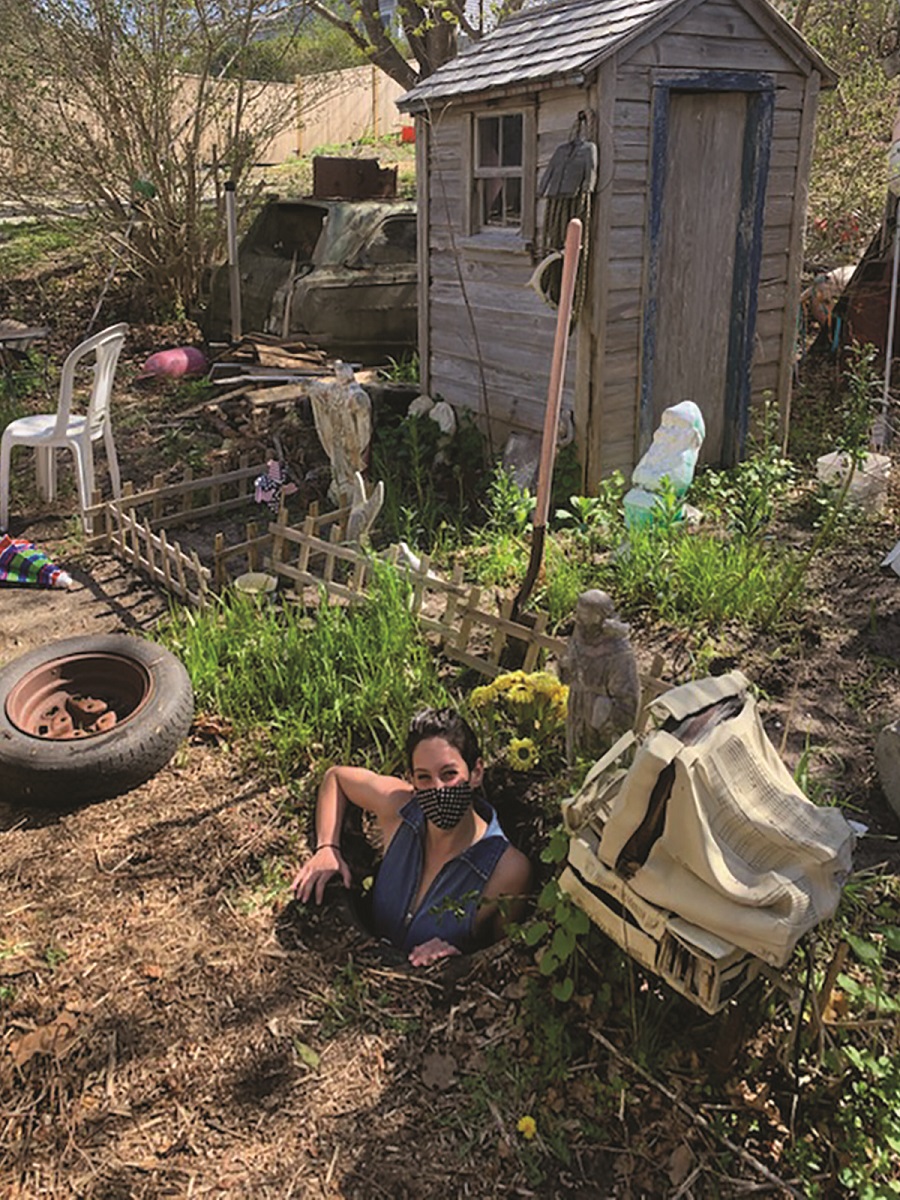TRURO — Installing a cesspool has been illegal in Massachusetts since 1978. They are considered “failed” septic systems. But people on the Outer Cape have kept on living with them because they were “grandfathered.” Upgrades have come slowly, with more effective Title 5 systems being installed when houses changed hands.
cesspool
WASTEWATER
A Dive Into Cesspools on the Outer Cape
All four towns have them, but removal strategies vary
TRURO — All four Outer Cape towns are focused on wastewater management, and for good reason: our drinking water comes from the same narrow sandbar that we live on, and that our wastewater, by necessity, is pumped into. The lenses of rainwater that are suspended in the sand may be invisible, but they are constantly in the thoughts of health officials and a major constraint on how property can be used.
When it comes to public discussion of wastewater, there is a clear pattern: nonprofessionals are eager to talk about new development, especially affordable housing. The professionals in the field, however, want to talk about cesspools.
At a Truro Board of Health meeting in December 2020, vice chair Jason Silva, a licensed septic engineer, gave an impassioned monologue about cesspools.
“A Title 5 septic system emits 25 to 40 milligrams of nitrates per liter,” said Silva. “A cesspool puts out anywhere from 20 to 200 mg/L — which is shocking. You have people on their own land, their own house, pumping out 120 mg/L. They’re not upgrading their system, they’re not reaching in their pocket to pull out $30,000 because it’s the right thing to do.
“I don’t see people routinely pumping out their system, either,” Silva added. “It’s a $300 fix to make a bad situation a little better, and that’s not even being acted on.”
Nitrates are harmful to aquatic life in both fresh and salt water and can be dangerous for human health as well. The EPA drinking water standard for nitrates in public water supplies is 10 mg/L.
Six months later, the Truro Board of Health became the first on the Outer Cape to require the removal of all cesspools — by the last day of 2023.
Provincetown, meanwhile, is working up a $75 million proposal to sewer the entire town, which would mean the end of cesspools in 2030.
Exactly how many cesspools there are, however, hasn’t been known until recently in Truro or Provincetown, and still isn’t known for certain in Wellfleet and Eastham. The Independent spoke with health agents in all four towns to find out exactly what is known about the quantity and location of cesspools.

When Truro created its new regulations last May, officials estimated there were just under 200 cesspools in town. In January 2022, Truro provided the Independent with a list of 168 properties with known cesspools. They are widely distributed, including along the Pamet River, Little Pamet River, and Shore Road.
Since then, 23 cesspools have been removed, and another 33 properties are in the process of upgrading their systems, Health Agent Emily Beebe said last week. More than half of the cesspool owners have contacted the town “to discuss how to come into compliance,” she said.
“We definitely feel we’re making progress, and we’re optimistic,” Beebe added.
Provincetown’s health department presented a detailed “Onsite Wastewater Status Report” to the select board in September 2021, including for the first time a cesspool total: 153. More than half are in areas of town that are at least partly sewered, including the Shank Painter area and the East End.
In January, the town gave the Independent a complete list of addresses with cesspools in response to a records request. That list showed 131 properties with one cesspool each, and one property with 22 cesspools, for a total of 132 properties and 153 cesspools.
The 22 cesspools were at 39 Ship’s Way, a single parcel that includes 23 residential units in nine buildings. Those houses are all vacant, though, with no active water usage at the property.
Mapping the addresses shows other significant clusters of cesspools, including on Pearl Street, Conwell Street, Howland Street, Cottage Street, and Shank Painter Road.
Other areas have almost none, though, including large parts of the far West End.
Eastham Health Agent Jane Crowley said the town keeps information on all septic systems but does not have a full list of properties that still use cesspools.
If a property owner asks for a building permit, Crowley said, upgrading the septic system is required. Sometimes the Eastham Board of Health requires property owners near fragile watersheds to upgrade to an innovative/alternative (I/A) system, Crowley added.
She said these “very stringent compliance triggers” have resulted in a “reasonable and effective program.”
Wellfleet has 3,148 septic system records for the town’s 3,856 developed lots. According to Health Agent Hillary Greenberg-Lemos, the properties with records are unlikely to have cesspools, and the lots without records certainly could.
“The board of health is very concerned about continued use of cesspools,” Greenberg-Lemos said.
At an April 13 board of health meeting, environmental engineer Anastasia Rudenko proposed two possible sewer districts, the first including private I/A systems at the affordable housing development at 95 Lawrence Road and the existing Harborside Trailer Park and a municipal sewer system for Duck Creek and the Cove.
The second proposed district added municipal systems at Drummer/Blackfish, Wellfleet Harbor, and Loagy Bay. Wellfleet has not yet made a decision on either proposed system, according to Greenberg-Lemos. The construction timeline is also unknown.
At that same meeting, Greenberg-Lemos outlined a draft regulation banning cesspools with a final removal date at the end of 2024, but there are no public hearings scheduled on that proposal, Greenberg-Lemos said.
MODERN LIVING
Truro Adopts New Water Protection Rules
About 200 home owners will need to replace their cesspools
TRURO — The board of health approved a series of updated regulations on May 18 governing cesspools, septic systems, and well-water testing. The most significant change is that all cesspools are now deemed to be “failed” systems. All of them must be replaced with modern septic systems by the end of 2023.
WASTE NOT
At Home in Jay Critchley’s Cesspool
Converting your old soak pit into a rental unit, experts warn, is a no-go
PROVINCETOWN — In 1997, Jay Critchley uncovered a backyard manhole, peered into a cesspool, and “discovered a new world.”
He had always known about his property’s cesspit, a pre-Title 5 relic that had sat unused for a decade and a half. But Critchley had never before felt compelled to study the pit, or to consider his defunct, inherited cesspool as anything more than just that.

On that day, Critchley, the activist-artist-provocateur, saw a split-level stage, an apartment-slash-commentary-on-artists’-living-conditions. Toned down a level, he saw something simpler: “A gorgeous space.”
Critchley’s cesspool is shaped like a cinder-block beehive. It swells at its widest point to six feet in diameter and extends five feet underground. In its past life, the beehive could fit a single family’s waste. Now, Critchley claims, it is quasi-livable. Long ago, to make the point, he carpeted the dirt floor, whitewashed the cinder blocks, added a mattress, electrical cord, TV, altar. He called it a Septic Summer Rental.
This was Critchley’s indictment of Provincetown’s looming affordable housing crisis, not an actual solution to the problem. Provincetown Health Director Morgan Clark stresses that “a livable space needs at least two means of egress, and natural light.” And, as she points out, “a cesspool has neither of those.”
“I know it’s tempting to make use of something you’ve used in the past,” says George Heufelder, who works with the Mass. Alternative Septic System Test Center in Sandwich. “But I could see no positive thing about using a used cesspool for anything else.” Not even for a root cellar? No, he says. “If there’s remaining organic matter in there, it can create sewer gases like methane, which do things like kill you.”
These are not facts Critchley cares to take up. His was a “good-sized unit, with a rooftop sundeck and a shared shower,” he recalls. He’d rent it now for at least a couple thousand a week, he says. Except that, after stints as a theater, an opera house, and a poetry stage, his cesspool has moved on.

Critchley’s cesspool can fit this reporter, sitting, with room for a friend. Standing is a different story.
What does it mean to have one’s body in a cesspool and one’s head extending from a manhole, level with Jay Critchley’s shins and a statue of Saint Francis? That, says Critchley, is called “a moment of transformation.”
The dirt floor is uncarpeted again. But some décor remains: five bunches of fake flowers; a windchime dangles near ground level; some slugs have made themselves at home. The first thought when one lowers oneself into a cesspool is neither “gorgeous” nor “transformative.” The first thought is, likely, “I am in a cesspool.”
Yet this cesspool does not smell like a cesspool. Its smell is dark, basement-y, two beats from unpleasant. Critchley calls it “flavor.”
A cesspool operates simply. Pipes carry waste from homes to their backyard pits. In Provincetown, those pits’ sides are mostly walled, with cinderblock or brick or pounded concrete. “This town is a sand dune,” says Critchley. “With no walls, a cesspool would cave in.” But the pit’s floor is open dirt. Liquids leach through it, into the water table; solids compost and decay.
Critchley has studied up on local cesspools, he says, deadpanning — his gift for deadpan is sublime — that he has seen enough beehives, prisms, and ordinary pits to propose a historic septic district to the town.

Before 1995’s Title 5 legislation, cesspools reigned supreme in Provincetown. Now, the law deems them “nonconforming systems.” They only come up, says Health Director Clark, “because they’re bad and need to turn into something better.” Clark estimates that about 150 functioning ones remain in town.
But Critchley has a point. Look past the slugs, past the worry about the possible contaminants entering your airways, and a quiet elegance reveals itself. When was the last time you studied a cinder-block beehive? Each of those blocks, says Critchley, was built specifically for its role in the structure. To the extent that cinder blocks can nestle, these ones do. Through the manhole opening above — a circle of blue sky and greenery — is Critchley’s face peeking in.
“It’s a small space for big ideas,” he says. “Do you feel transformed?”
currents
This Week In Truro
Meetings Ahead
Meetings are held remotely. Go to truro-ma.gov, click on the meeting you want to watch, and open its agenda for instructions on how to watch or take part online.
Thursday, May 13
- Climate Action Committee, 10:30 a.m.
- Housing Authority, 4:15 p.m.
Friday, May 14
- Commission on Disabilities, 3:30 p.m.
Monday, May 17
- Local Comprehensive Planning Committee, 7 p.m.
Tuesday, May 18
- Planning Board, 2:30 p.m.
- Select Board, 3 p.m.
- Board of Health, 4:30 p.m.
Wednesday, May 19
- Planning Board, 5 p.m.
Thursday, May 20
- Climate Action Committee, 10:30 a.m.
Conversation Starters
Cesspool Ban Expected May 18
About 100 Truro home owners with cesspools may soon have to upgrade to Title 5 septic systems.
The board of health has drafted a regulation banning cesspools by Dec. 31, 2023. After many discussions and public hearings, the board is expected vote to adopt that regulation on Tuesday, May 18, at 4:30 p.m., said Health Agent Emily Beebe.
Cesspools, which are concrete pits in the ground with holes where waste flows directly into the dirt, don’t do much to purify wastewater. They are major causes of pollution to neighboring wells and nearby ponds, bays, and rivers.
Cesspools are considered “failed” systems. Currently, they must be upgraded whenever a property sells. But many home owners get around this rule when the property is passed down to children or other relatives within a trust. Truro’s proposed regulation will stop that practice. If adopted on May 18, Truro would require a septic inspection and upgrade when ownership changes even within a trust, Beebe said.
Moreover, everyone will be required to upgrade their cesspool by the end of 2023, even if they aren’t selling the property.
It can cost $50,000 to replace a cesspool with the new system. Select board member Jan Worthington said she worries that people just cannot afford it.
“So, I hope there are grants or efforts available to help,” Worthington said.
Barnstable County offers a loan program at 5-percent interest over 20 years for anyone with a failed system, which requires no money up-front, said Tracey Rose, the board of health chair. —K.C. Myers
EFFLUENT
Truro Cesspools May Be Banned in 3 Years
Pond Village neighbors’ concerns spur action
TRURO — The 100 Truro residents who have cesspools will have three years to hire engineers, get permits, and install new Title 5 septic systems if a proposed board of health regulation is adopted.
The board of health on Jan. 4 approved a draft of a ban on cesspools by Dec. 31, 2023. These wastewater pits discharge nitrogen into the ground in high amounts — from 60 to 120 milligrams per liter (mg/L), according to Brian Baumgaertel, director of the Mass. Alternative Septic System Test Center. A Title 5 tank can discharge effluent at 35 mg/L of nitrogen to a leaching field. Once it passes through the leaching field, the nitrogen level is down to 25 mg/L.
Cesspools, which are concrete pits in the ground with holes where waste flows directly into the dirt, are automatically defined as “failed” septic systems and must be replaced when ownership of a home is transferred. But properties passed down from one generation to the next don’t trigger the requirement to upgrade. That is why so many properties in town still have cesspools — about 100, Health Agent Emily Beebe told the board of health.
Truro has been buzzing with water quality discussions related to the Cloverleaf, the 39-unit affordable housing development near Pond Village that was given a comprehensive permit on Jan. 14. The new development will have a system expected to bring the nitrogen content of its wastewater down to 5 mg/L.
Pond Village has a history of water quality problems, due partially to poorly maintained septic systems and to five cesspools in that neighborhood, Beebe said.
It’s not the first time the board of health has discussed banning cesspools. In 2016, the board wanted to set a cesspool sunset date of 2022, said Tracey Rose, board of health chair. The Cloverleaf project and Pond Village neighbors’ concerns spurred renewed attention to the issue.
The board of health, which must hold a public hearing to finalize its regulation, voted to have cesspools replaced with Title 5 systems in the ground by the end of 2023.
Replacement costs can run as high as $50,000, although Barnstable County offers a loan program at 5-percent interest over 20 years to finance the expense, Beebe said.
“The Barnstable County loan program is so well run,” Beebe said. They walk the home owners through the process of permitting; even changes to landscaping, plumbing, and electrical systems related to the septic upgrade can be added to the loan, she added.
It’s unknown if any other Massachusetts towns have imposed a similar regulation. Morgan Clark, Provincetown’s health director, said she had not heard of any, but she applauded Truro’s proposal.
